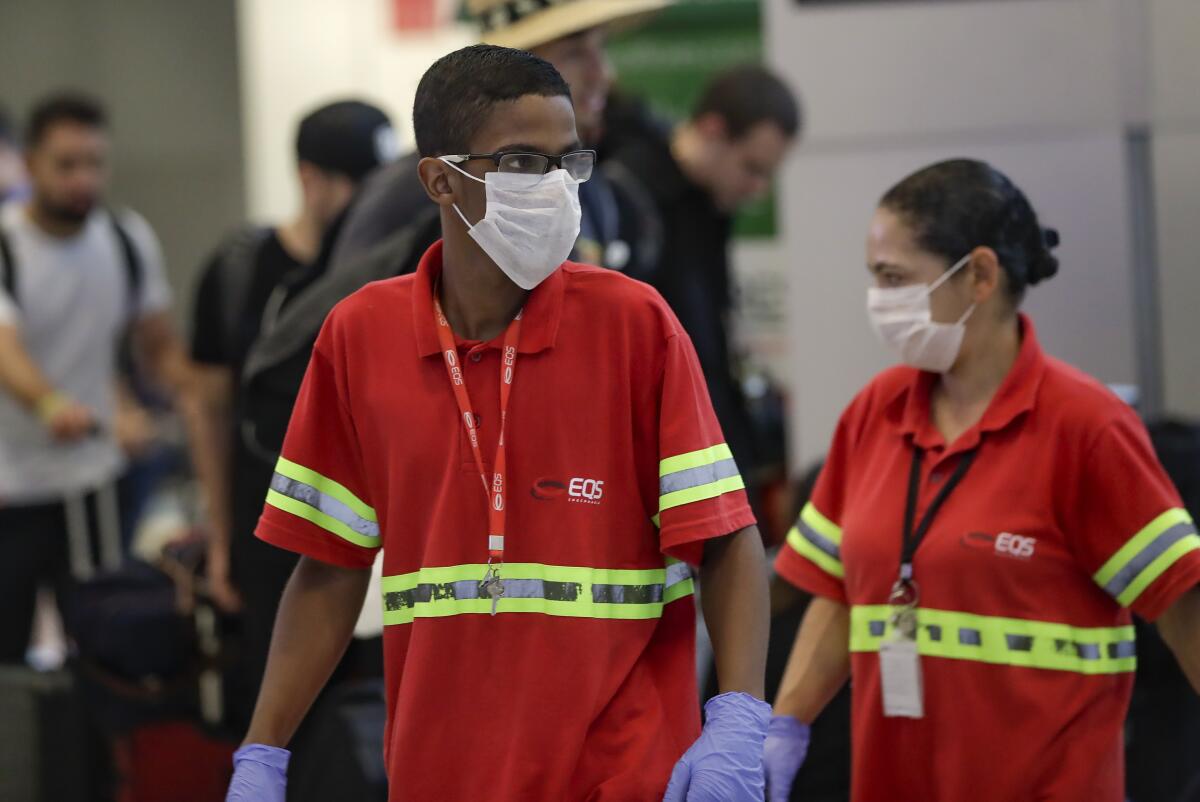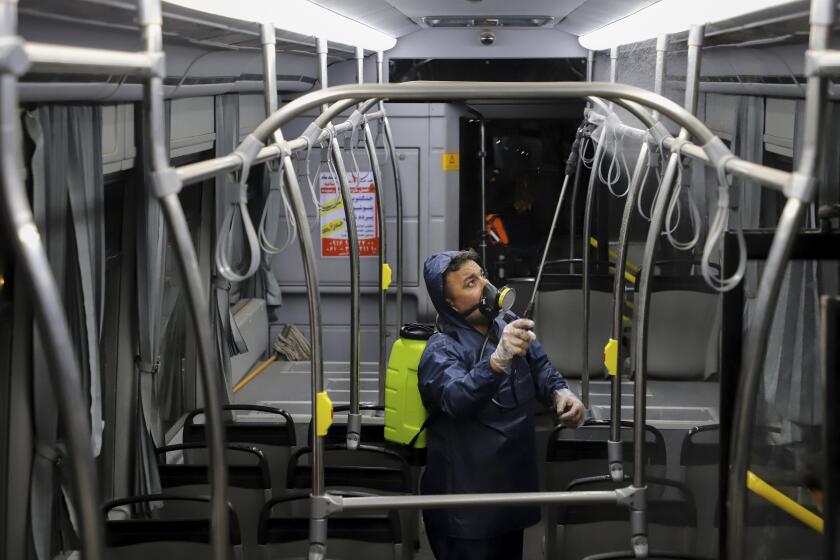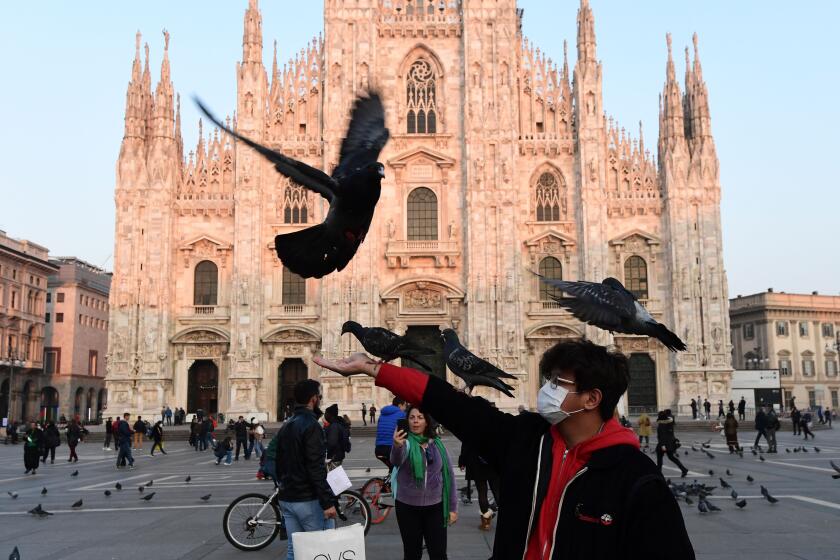Brazil confirms first coronavirus case in Latin America

- Share via
RIO DE JANEIRO — Brazil’s government confirmed on Wednesday that a 61-year-old Brazilian man who traveled to Italy this month has Latin America’s first confirmed case of the contagious new coronavirus.
“We will now see how this virus behaves in a tropical country in the middle of summer, how its behavior pattern will be,” Brazil’s Health Minister Luiz Henrique Mandetta said in a news conference.
The Brazilian man spent two weeks in northern Italy’s Lombardy region on a work trip, where he contracted the contagious virus, the health ministry said.
Authorities had already said Tuesday evening that a first laboratory test for the COVID-19 virus had a positive result, and were waiting for a second test to confirm.
Since the virus began to spread from China throughout the world, Brazil and other countries in the region have registered dozens of suspected cases, all of which previously had been discarded following tests.
A spokesman for Iran’s Health Ministry says the head of the country’s counter-coronavirus task force has tested positive for the virus.
According to the Health Ministry, the man began to show symptoms compatible with the illness, including a dry cough, throat pain and flu symptoms. Lombardy is the epicenter of the outbreak in Italy, and there have been hundreds of confirmed cases there as well as several deaths.
Sao Paulo’s Albert Einstein Institute, where the man received medical attention, carried out respiratory tests, and the Adolfo Lutz Institute in the same city carried out the subsequent test confirming the virus. The man was in stable condition and in isolation at home in Sao Paulo.
Brazil’s national health agency Anvisa has been working to map all contact the man had with other people in the hospital, at home and on the plane returning to Brazil. On Tuesday, Anvisa requested the flight manifest to investigate other possible cases.
The Health Ministry said that the man received some 30 family members at his home after returning to Sao Paulo on Feb. 21. Those people are under observation, as are passengers from the plane.
“Our healthcare system has already undergone grave respiratory epidemics before,” Mandetta said. “We will get through this situation, investing in science, research and clear information.”
Residents of the biggest city in Latin America were beginning to acknowledge the risks of an epidemic. Thiago Alves, the manager of a drugstore in central Sao Paulo, said he had sold more than 3,000 masks on Wednesday.
“We are already short and it isn’t even the beginning of the afternoon,” he said.
Attendance was light at many schools in downtown Sao Paulo and there were few customers in Chinese shops and restaurants.
Sao Paulo’s stock exchange, which had been closed since Friday due to the Carnival holiday, was down 5% shortly after 2 p.m., something that economist André Perfeito attributed to “the global outbreak of coronavirus, not necessarily its arrival here.” Global stock markets had dipped sharply while the Brazilian exchange was closed.
Four years ago, Latin America’s largest country found itself under the microscope as the spreading Zika virus was linked to cases of microcephaly in babies just ahead of the Summer Olympics in Rio de Janeiro.
Brazil’s response was deemed adequate by international organizations and its public healthcare system handled most cases, though medicine was in short supply in many isolated areas of the northeast region. Some foreign sports fans and competitors still canceled their plans to attend South America’s first Olympics.
As of Wednesday, there were 20 suspected cases of the new coronavirus in Brazil, 12 of which were people who returned from Italy. Authorities have so far ruled out 59 cases that were suspected since the outbreak began.
It is unclear how the virus reached Italy. Milan, the nation’s business capital, has been hit hard, as well as cities in the surrounding Lombardy region.
Due to the spread of the virus worldwide, Brazil adopted the preventative measure of broadening its critieria for analysis of suspected cases on Monday. The Health Ministry had determined that people with fever and flu symptoms returning from Italy and six other countries should be considered suspected cases. Those countries are Germany, France, Australia, Malaysia, the United Arab Emirates and the Philippines.
The countries already on the watch list were China, Japan, Singapore, South Korea, North Korea, Thailand, Vietnam and Cambodia.
The news of the virus reaching Brazilian soil comes as the nation emerges from its annual Carnival revelry. Amanda Pereira, who joined a street party on Wednesday with her young daughter, said, “I worry a lot because my daughters have breathing problems, so we will stay alert.”
Asked whether Brazilians should cancel plans to visit Europe, Mandetta said this is “just another reason for domestic tourism” and said that people should use “good sense.”
“If it’s not necessary, why are you going to book? Wait for us to see if this starts to behave better,” he said. “Now, we also can’t stop our lives because there is a respiratory syndrome.”
More to Read
Sign up for Essential California
The most important California stories and recommendations in your inbox every morning.
You may occasionally receive promotional content from the Los Angeles Times.












